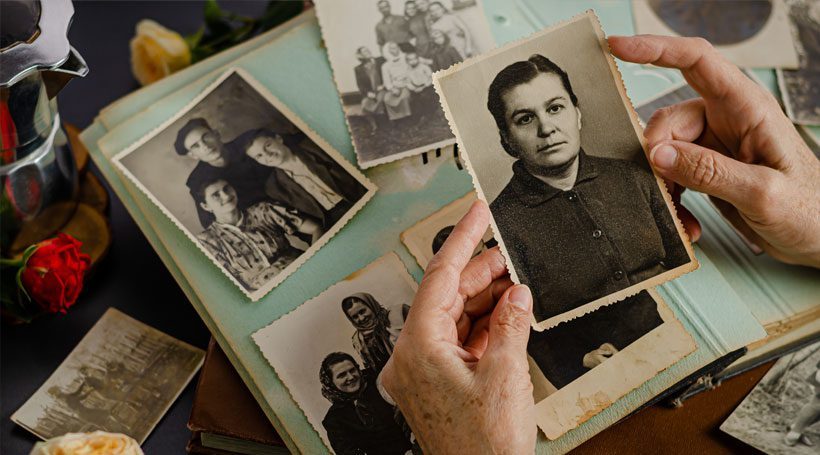Caring for someone with dementia brings changes that are hard to miss. It doesn’t feel too personal when it’s misplaced keys, forgotten appointments and the same questions asked over and over. But when the person you love can no longer remember the names of those closest to them, it hits hard.

Sara Pagliaro, DO
That’s often the moment that sharply brings home the emotional challenge in caring for someone with dementia, experts say. Loved ones often remember when mom or dad stops addressing them properly, because it is so distressing.
And because signs of dementia in the beginning are subtle and can be mistaken for normal aging, a diagnosis often takes families off guard. Realizing that these early warning signs aren’t something you can just fix and knowing a little about what to expect down the road can help both the person with dementia and their families start to adjust to what’s coming.
The wrong name
It’s not a good idea to correct someone with dementia when they get your name wrong, says Sara Pagliaro, DO, vice president of medical services at Samaritan. It won’t help them now or in the future by pointing out what they’re having trouble remembering. Still, it’s understandable if your impulse is to try. “It’s a real-time realization that the person with dementia is forgetting what we think are basic and important, important things,” she says. “That’s the first step to understanding the disease process and grief related to this type of loss.”
“Correcting your loved one usually leads to an increased level of frustration and caregiver burden,” Pagliaro explains. “And for the person with dementia, the short-term memory loss is just that. They’re not going to remember that you told them they were incorrect and it can be distressing to them when you point that out.”
The best approach, she says, is to let it go and understand it’s not personal, she says. “The path of least resistance is to allow them to use the incorrect name. Your goal is to provide loving support and care, which means limiting their concern that they are getting the details wrong.”

Angela Imperiale
Photos & memories
Photos can bring up memories, but not always happy ones, says Angela Imperiale, director of memory support services at United Methodist Communities in Collingswood.
“Some people can look at a picture and get excited, but photos can also make people remember traumatic events,” she says. “Sometimes they will see a photograph from long ago, and it can feel to them like that traumatic event just happened.”
When sharing photos, Imperiale says, be selective. Pictures, including family portraits, that have always brought the person joy could help get them talking about happy times and be a joyful experience.
“It’s very individual,” she adds. “Sometimes people are fine with photos one day but then it could lead to a breakdown. If that happens, the best thing to do is basically apologize and then just redirect them to something else.”
Handling nighttime confusion
Like younger children, adults with dementia have a harder time holding it together as the day wears into night. There’s actually a term for it: sundowning. A loved one may have had a great day, but later on they might seem more confused and less aware of where they are, even if it’s a place they know well. They might become anxious, restless or irritable for no clear reason. Some might pace around, get upset easily or even see or believe things that aren’t real.
The way to minimize sundowning is by having a solid routine and sticking to it, especially around bedtime. That way, even though they are irritable, they’re not encountering anything out of the ordinary. And if it’s still not working out so well, be flexible and choose your battles. Medication may be a must, but teeth brushing can always be skipped to avoid sundowning. Also, be aware that as the disease progresses, sundowning often comes earlier, so you’ll want to alter the bedtime routine (maybe start late in the afternoon) if it persists.
Protect your well-being
After years or months of a loved one’s decline, a dementia diagnosis doesn’t change everything overnight, but emotionally it may feel that way, says Pagliaro.
“Caregivers will enter into what we call the grieving process,” she says. “The grief process is complex. It’s different for everyone and will even change throughout the process as the disease progresses.”
Without allowing for an emotional release, caregivers will suffer more, she adds. “Like parenting, oftentimes caregivers spring into action to check tasks off a list, but there’s a danger of pushing their emotional and physical wellbeing to the very end.”
Besides acknowledging the toll, the best protection is learning more about dementia, relying on your community resources available to help with care and having early conversations about advance-care planning, she says. A good place to look for support is on county government websites, which list various local options.
“No one has to go through this alone,” adds Imperiale. “This is not something that happened to one person one time. There are so many people going through this who are willing to help you through it.”














